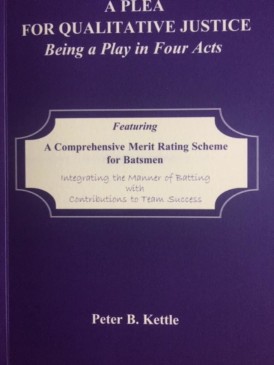A Plea For Qualitative Justice
Martin Chandler |Published: 2019
Pages: 76
Author: Kettle, Peter
Publisher: Peter Kettle Associates
Rating: 3 stars

In recent years it seems that, increasingly, writers, historians and statisticians have been redoubling the efforts that have long been made to improve and refine the traditional measures of the quality of batsmen and bowlers, their averages.
Lest I run the risk of being accused of some sort of hypocrisy I will admit at the outset to having been involved, to a modest extent, in the research for Masterly Batting and Supreme Bowling, so I have had my moments where this sort of thing is concerned, and do have some understanding of the motivations that drive people to carry out the research involved.
The rationale for all this is that there must be a better way of ranking cricketers than just by numbers, and of course logic dictates that must be right. To give the most simple of examples a tedious double century against a modest bowling line up in good conditions must be worth less than a stylish half century against a top class attack on a difficult wicket.
It was with that in mind that Masterly Batting attempted to rank the greatest Test match centuries, and Supreme Bowling the best fife-fers. We aren’t alone however. Cricketweb’s Steve Ferrier (better known on the forum as Days of Grace) has done something very similar, as did Wisden at the beginning of the century and, I learnt from Peter Kettle’s four act play, that others have trod if not the same path, then one close by. In truth the results probably indicate that the traditional measures are as good as any, but that in no way detracts from the pleasure to be gained by these arguments and the continuing search for the Holy Grail of the definitive means of ranking cricketers.
Bearing in mind what I have said I believe I can however say with certainty that whoever else has visited these issues before they have not done so in the way that Kettle does. He himself has, in Rescuing Don Bradman from Splendid Isolation, been known to play with cricket statistics. On this occasion he has done the same, but in a very different way. He has expressed his ideas in the form of a play in four acts, portraying a family of cricketing enthusiasts discussing the subject and, in the fourth act, with the assistance of a friendly barrister, they come to a conclusion.
The plot, if I may call it that, is one that I have to confess to not finding particularly easy to follow. I had to backtrack several times and even then I was never entirely confident I had understood what was happening. I anticipate this is my fault rather than Kettle’s, as thinking back to the days when I studied ‘O’ Level English Literature I recall having similar problems reading plays from scripts, so I am left wondering whether this might not have come across better had Kettle put together a podcast to bring his characters to life.
Nonetheless A Plea For Qualitative Justice remains an interesting effort, and one which I sure the likes of Steve Ferrier and Dave Wilson will find stimulating and the book is certainly recommended to them, and indeed to anyone who has enjoyed their work.






Leave a comment